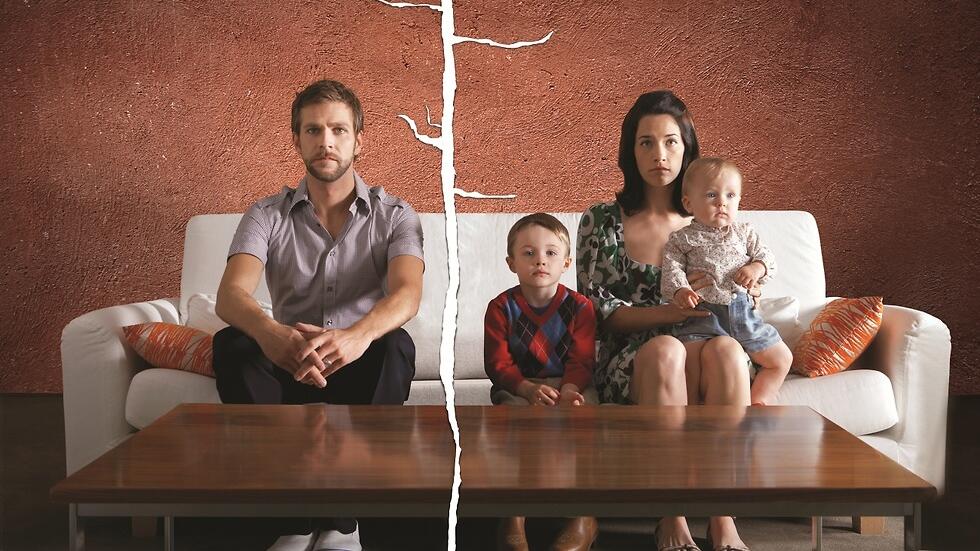Couples who really want to get divorced, but find themselves facing lawyers’ fees, division of property, the need for a second home, alimony payments along with a variety of new financial challenges, are increasingly deciding to stay together.
Even couples who pluck up the courage to get divorced in these economically volatile times have, unwillingly, gone back to living under the same roof. They simply can’t deal with the current economic realities. This beckons the question: How does a couple, who just want to live separately, overcome obstacles and continue living together?
Is saving money really worth the rows, arguments and lack of personal space? And if getting divorced is so expensive, how do divorced couples manage to meet double expenses in an economic recession?
Gil and Dana, aged 38 and 42, from Tel Aviv have two small children and got divorced a year ago. They met through a mutual friend and were married eight years ago. They hit a turning point five years into their marriage.
“When the pandemic started, we hit a very serious economic crisis, which slowly began affecting our relationship, eventually destroying it. Gil is an events photographer who was furloughed. I was a full-time mother with two small children, so I wasn’t working at the time either.“
Dana explains: “It’s absurd. the economic crisis during the pandemic broke us up, but our present economic crisis has kept us together for over a year.”
Dana admits that she expected Gil to seek out new, creative, alternative ways of supporting the family. Gil says he expected Dana to be more sympathetic and supportive in light of his depression brought about by unemployment.
He even suggested she step in to help out financially rather than forcing him to do it. Talking to them, I feel I’m on a battleground and wonder how they can actually live together with so much baggage.
“It’s not like we have any choice,” Dana says. “We’ve been forced into this situation. Gil has recovered financially and I’ve started working as a secretary at a law firm, but the way the country is now, it’s just not enough.
"Our families aren’t in a position to help out. We own a small three-roomed apartment that we bought together, but selling it wouldn’t bring in enough to buy two homes instead. And paying rent would just be losing money.“
The couple is candid about their inability to meet divorce expenses. “We’re hardly making it through the month, so how would we pay lawyers? How could we possibly pay twice the expenses we’re paying now? That’s how it is.” Their frustration is clearly audible. “Getting divorced is too expensive for us.”
Despite all of these difficulties, the two have a strategy: “We won’t live like this forever. We both have ‘divorcés’ saving plans’ spread over two years.”
Gil explains that they’ve sought guidance from a financial advisor specializing in divorced couples and they’ve written up a financial plan striving for separate financial independence. In the meantime, they meticulously list income and expenditure and try saving wherever possible. This is the only way they’ll be able to get divorced and sustain a reasonable standard of living.
“We’ve made the divorce a mission as a couple. Our common aim has drawn us closer, not made us enemies - despite endless problems, disagreements, bruised egos and the desire both of us to be alone," Gil explains.
Over the past two years, haven’t you had second thoughts about breaking up?
Dana: “Not at all. Not on my side at least.”
Gil: “We’re separated but we don’t have relationships with other people. We function like a married couple. No one knows we’re separated.“
Don’t your families know you’re separated?
“They don’t. There’s no point telling them. We operate like a married couple. Most importantly, we don’t want the children to know at the moment. If they were to ask why we’re not getting a divorce, what would we say? That we don’t have the money? That we’re saving up for it? It’s embarrassing. We call ourselves ‘roommates with children,' or ‘friends with benefits and children.'”
In November, “Forbes” magazine published research conducted at the University of Virginia finding this to be a global phenomenon. It turns out that inflation, compounded by economic recession, has forced married couples to think up alternative solutions to divorce.
Despite the emotional conflicts and strains resulting from financial insecurity, research has found that the economic crisis has actually led to fewer couples getting divorced. While some couples reconcile, trying to keep the family together, to avoid costs, others simply don’t get the divorce.
But, what happens to couples who do get divorced, and then realize they can’t meet the costs of separate living expenses?
I spoke to Yogev and Sharon, aged 32 and 33, from Beer Yaakov who have been living together for two years since their divorce. Yaron manages a cosmetics distribution line and Sharon is a kindergarten teacher. “I’m very traditional and I wanted to do things correctly. So, although I knew it would be financially hard, I fought tooth and nail for this marriage.”
They met as children and started dating after their mandatory military service. They were married four years later. Six years and two children into the marriage, they broke up. “Let’s be honest,” says Yogev. “I wasn’t faithful to Sharon. I was meeting women on social media.” When I ask Yogev if he regrets his actions, Sharon cuts us off, declaring she’s not interested in talking about “his affairs.”
And yet, you’re still living together
“We live together for two reasons,” Sharon responds. “We have two children, so even if he were a murderer, it wouldn’t change the fact that we’ll be connected to one another forever. The second reason is that I can’t raise two small children and take care of the home knowing that the alimony and my monthly salary just aren’t enough to keep us going.”
The two explain that tried to lead financially separate lives, but weren’t pleased with the results. “Yogev rented a small apartment for NIS 3,000 (USD 849) a month. With paying municipal taxes, water, electricity, food etc., it was just too wasteful."
"It’s money that could be saved or spent on the children,” Sharon explains. Yogev adds: “Before we got divorced, we’d been saving and we were close to buying a home, but the divorce meant that never happened. It’s now become a distant dream. Essentials like bread and gas, have gotten more expensive. Homes too.“
What about new relationships?
Sharon has been in a relationship for a year and a half and Yogev classifies himself as “open to offers.” I wonder how one manages a relationship when living with one’s ex-husband. Sharon is frank: “We meet up outside the home. I go to his place. I have a free babysitter for when we go out on dates or when we take a vacation,” she laughs.
Chuckles aside, I can’t help but wonder how long this living arrangement can last. Yogev has a creative answer: “We were thinking of saving up a bit more, or waiting for house prices to come down and buying a home together with a separate living unit."
"Sharon will live in the house with the children and I’ll live in the separate unit. We’ll have a family life, with as much privacy as possible, minimum expenditure and maximum family.”
Opal Levi, 38, from Tel Aviv met her future ex-husband when she was 22. She was still young and hadn’t really found herself yet. He already had a successful business. “I was impressed by his assertiveness, money, power and what he had achieved. As a girl of 22, that’s what made him attractive to him.
"He was a successful businessman man while I was waiting tables. The economic discrepancy between us quickly made me very dependent on him. He paid off a debt for me, helped me buy a new motorbike and even filled up my mother’s refrigerator.” She admits: “It was magic for me.”
The couple married after dating for six years. They have two children, aged seven and nine. Three years into the marriage, the couple hit their first serious crisis of trust. “I wanted to get divorced then. But it was a hard decision and a frightening prospect. We had a year-old toddler.
"I’d given up my career as a cosmetologist for a family life, so I wasn’t working at the time. We also had a prenuptial agreement and I knew that if we got divorced, I’d be left with nothing. But as our relationship was so healthy, and despite my financial fears, I ultimately decided to forgo everything and get divorced.”
Opal would be the first to admit that her fear of being unable to survive alone financially had governed her life for the four years leading up to the decision.
“At first, we rented two homes and lived separately. He wanted to be a good father and be with the children. So, two months later he moved in with me. I agreed as I didn’t think I could survive on my own financially. I was fired during the pandemic and was forced to use up all my savings.”
Did you manage to live together?
“Not really. Those were four terrible years. It was very unstable. There was a lot of jealousy. Worst of all, the children were living in a home in which their parents fought constantly and didn’t love each other. My mother and sister were very supportive.
"They realized it couldn’t go on like that. Looking back, I now realize that the whole living-together-not-living-together project had turned me into a marionette. I went along with everything because I didn’t think I could survive on my own. I let myself become financially dependent because I didn’t value myself and or my abilities.”
Three years on, Opal now manages her own beauty clinic in central Tel Aviv and she and her ex-husband have joint custody of the children.
To what do you owe your success?
“Hard work and believing in myself. When we got divorced, I was in desperate need of financial stability, so I worked from eight to three for a paycheck. I’d then work as a cosmetologist from home in the afternoons and waitressed in the evenings. I had expenses I’d never had before. So, I worked three jobs to get to where I am today."
Opal advises women to be clever and remain financially independent. “You have to save for a rainy day. If I had saved, my transition to financial independence could have been much easier, less paralyzing, less daunting.
"From a girl who thought she never make it on her own, I’ve turned into a strong, independent woman who understands she can do everything. Thank God. Yes, the first step is the most frightening, but from the lowest places, you can reach the giddiest heights.“
If you’re wondering how to get divorced without going bankrupt when inflation and the cost of living are so high, listen to Shahar Shirazi and Liraz Mishmarti, aged 39 and 44, from Holon.
They’ve been divorced for a year and have joint custody of their children. Liraz works as a student guidance counselor at the College of Management and Academic Studies (COLMAN) and is self-employed as make-up artist and jewelry designer. Shahar manages the website of Israeli fashion brand Adika. They both work full-time. “We’re lousy as a couple, but we’re the best of friends," Shahar laughs.
The couple met at a nightclub. Liraz says it was love at first sight. They got married after three years together. After nine years of marriage and two children, who are now five and nine, they decided to get divorced.
“It was hard when we got married. We couldn’t save. We felt we weren’t wasting money, but that we weren’t moving forward. The Paamonim NGO offered us free financial advice. They explained the importance of keeping an Excel chart of expenses versus revenue and generating tax returns.”
Shahar says: “When we decided to get divorced, I stayed in the house as it’s owned by my family and Liraz left and rented an apartment in Holon. I was her guarantor.“
To keep the family together, they remained within walking distance of one another: “We make kiddush on Friday nights together,” Liraz tells me. “We’re still a family. We call it co-parenting. We have a certain responsibility as parents and we’re raising the children together, just in separate houses.“
Despite their financial savviness, Liraz admits that she was afraid of going out and trying to become financially independent. “Shahar was the main breadwinner. When I wanted to get divorced, I cried my eyes out. I was terrified of not making it work and being unable to support my children. Our mediator, who saw us through it, helped and guided me regarding investments.”
“He just said to me: ‘If you want to get divorced, you need to learn how to increase your revenues.’ So, I cleaned houses for a while and I came up with creative solutions. I had to leave my comfort zone and convert my fears to compulsion. I keep Shabbat and believe that my livelihood comes from Heaven, but we have to make the effort.“
Liraz emphasizes that joint custody is a great financial solution. “Although there’s less alimony, it’s easier to earn more. There are days I don’t have the children, so I can put in more hours. Once a week, I have a jewelry stall in Holon and I give birthday workshops. I have time to develop my career as well as time for myself.
“She took something she liked and turned it into more income," says Shahar. "At Paamonim, they taught us that instead of cutting down expenditures, we should learn to increase revenue.”
Liraz adds that saving takes up a large part of her life. “I make my own spelt bread and granola bars at home instead of buying them. I do my best not to buy food when I’m out. I also do my own beauty treatments at home. I try saving. Instead of credit cards, I use direct debit cards where the money comes off automatically.”
They jokingly finish off by telling me that the Persian community has taught them how to save.
“Shahar took a trip to the north of the country with a group of divorced guys. I didn’t have time to buy food for Shabbat, so I did my shopping at his house. I took stuff from the fridge and the cupboards,” Liraz laughs.
Shahar adds: “I use her Netflix account and she used to do her laundry at my house before she could afford her own washing machine. She used my hot water and all sort of other goodies.”
“The secret is co-operation, solidarity, helping each other out and just being good friends.”










